- Clone
- M5E2 (See other available formats)
- Regulatory Status
- RUO
- Workshop
- III 329
- Other Names
- LPS receptor
- Isotype
- Mouse IgG2a, κ
- Ave. Rating
- Submit a Review
- Product Citations
- publications
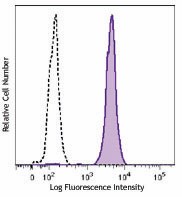
-

Human peripheral blood monocytes were stained with CD14 (clone M5E2) Brilliant Violet 510™.
| Cat # | Size | Price | Quantity Check Availability | Save | ||
|---|---|---|---|---|---|---|
| 301841 | 25 tests | $204 | ||||
| 301842 | 100 tests | $402 | ||||
CD14 is a 53-55 kD glycosylphosphatidylinositol (GPI)-linked membrane glycoprotein also known as LPS receptor. CD14 is expressed at high levels on monocytes and macrophages, and at lower levels on granulocytes. Some dendritic cell populations such as interfollicular dendritic cells, reticular dendritic cells, and Langerhans cells have also been reported to express CD14. As a high-affinity receptor for LPS, CD14 is involved in the clearance of gram-negative pathogens, and in the upregulation of adhesion molecules and expression of cytokines in monocytes and neutrophils.
Product DetailsProduct Details
- Verified Reactivity
- Human, Cynomolgus, Rhesus
- Reported Reactivity
- African Green, Capuchin Monkey, Cow, Chimpanzee, Common Marmoset, Cotton-topped Tamarin, Dog, Pigtailed Macaque, Squirrel Monkey
- Antibody Type
- Monoclonal
- Host Species
- Mouse
- Immunogen
- Full-length human CD14 protein
- Formulation
- Phosphate-buffered solution, pH 7.2, containing 0.09% sodium azide and BSA (origin USA).
- Preparation
- The antibody was purified by affinity chromatography and conjugated with Brilliant Violet 510™ under optimal conditions.
- Concentration
- Lot-specific (to obtain lot-specific concentration and expiration, please enter the lot number in our Certificate of Analysis online tool.)
- Storage & Handling
- The antibody solution should be stored undiluted between 2°C and 8°C, and protected from prolonged exposure to light. Do not freeze.
- Application
-
FC - Quality tested
- Recommended Usage
-
Each lot of this antibody is quality control tested by immunofluorescent staining with flow cytometric analysis. For flow cytometric staining, the suggested use of this reagent is 5 µl per million cells in 100 µl staining volume or 5 µl per 100 µl of whole blood.
Brilliant Violet 510™ excites at 405 nm and emits at 510 nm. The bandpass filter 510/50 nm is recommended for detection, although filter optimization may be required depending on other fluorophores used. Be sure to verify that your cytometer configuration and software setup are appropriate for detecting this channel. Refer to your instrument manual or manufacturer for support. Brilliant Violet 510™ is a trademark of Sirigen Group Ltd.
Learn more about Brilliant Violet™.
This product is subject to proprietary rights of Sirigen Inc. and is made and sold under license from Sirigen Inc. The purchase of this product conveys to the buyer a non-transferable right to use the purchased product for research purposes only. This product may not be resold or incorporated in any manner into another product for resale. Any use for therapeutics or diagnostics is strictly prohibited. This product is covered by U.S. Patent(s), pending patent applications and foreign equivalents. - Excitation Laser
-
Violet Laser (405 nm)
- Application Notes
-
The M5E2 antibody inhibits monocyte activation and cytokine production induced by LPS. Additional reported applications (for the relevant formats) include: immunohistochemical staining of acetone-fixed frozen sections, blocking of LPS stimulation4, and immunofluorescence microscopy5. Clone M5E2 is not recommended for immunohistochemical staining of formalin-fixed paraffin-embedded sections. The Ultra-LEAF™ purified antibody (Endotoxin < 0.01 EU/µg, Azide-Free, 0.2 µm filtered) is recommended for functional assays (Cat. No. 301861 and 301862).
-
Application References
(PubMed link indicates BioLegend citation) -
- McMichael A, et al. 1987. Leucocyte Typing III. Oxford University Press. New York.
- Knapp W, et al. Eds. 1989. Leucocyte Typing IV. Oxford University Press. New York. (IHC-F)
- Schlossman S, et al. Eds. 1995. Leucocyte Typing V. Oxford University Press. New York.
- Power CP, et al. 2004. J. Immunol. 173:5229. (Block)
- Williams KC, et al. 2001. J. Exp. Med. 193:905.
- Iwamoto S, et al. 2007. J. Immunol. 179:1449. (FC) PubMed
- Santer DM, et al. 2010. J. Immunol. 485:4739. PubMed
- Yoshino N, et al. 2000. Exp. Anim. (Tokyo) 49:97. (FC)
- Zizzo G, et al. 2012. J. Immunol. 189:3508. PubMed
- Stoeckius M, et al. 2017. Nat. Methods. 14:865. (PG)
- Peterson VM, et al. 2017. Nat. Biotechnol. 35:936. (PG)
- Product Citations
-
- RRID
-
AB_2561379 (BioLegend Cat. No. 301841)
AB_2561946 (BioLegend Cat. No. 301842)
Antigen Details
- Structure
- GPI-linked membrane glycoprotein, 53-55 kD
- Distribution
-
Monocytes, macrophages, granulocytes (low)
- Function
- LPS receptor, clearance of Gram-negative pathogens
- Ligand/Receptor
- LPS
- Cell Type
- Granulocytes, Macrophages, Monocytes, Neutrophils
- Biology Area
- Cell Biology, Immunology, Innate Immunity, Neuroinflammation, Neuroscience
- Molecular Family
- CD Molecules
- Antigen References
-
1. Stocks S, et al. 1990. Biochem. J. 268:275.
2. Wright S, et al. 1990. Science 249:1434. - Gene ID
- 929 View all products for this Gene ID
- UniProt
- View information about CD14 on UniProt.org
Related FAQs
Other Formats
View All CD14 Reagents Request Custom ConjugationCustomers Also Purchased
Compare Data Across All Formats
This data display is provided for general comparisons between formats.
Your actual data may vary due to variations in samples, target cells, instruments and their settings, staining conditions, and other factors.
If you need assistance with selecting the best format contact our expert technical support team.
-
APC anti-human CD14
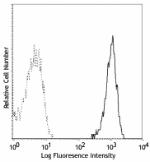
Human peripheral blood monocytes stained with M5E2 APC -
FITC anti-human CD14
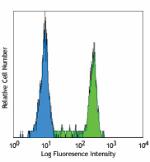
Human peripheral blood monocytes stained with M5E2 FITC -
PE anti-human CD14
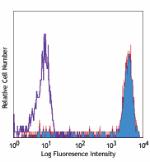
Human peripheral blood monocytes stained with M5E2 PE -
Purified anti-human CD14

Human peripheral blood monocytes stained with M5E2 APC -
PE/Cyanine7 anti-human CD14
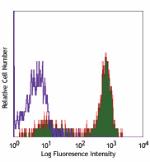
Human peripheral blood monocytes stained with M5E2 PE/Cyanin... -
Alexa Fluor® 488 anti-human CD14
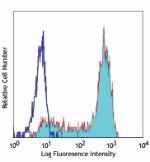
Human peripheral blood monocytes stained with M5E2 Alexa Flu... -
Alexa Fluor® 647 anti-human CD14
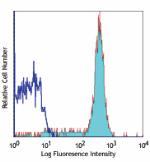
Human peripheral blood monocytes stained with M5E2 Alexa Flu... -
Ultra-LEAF™ Purified anti-human CD14
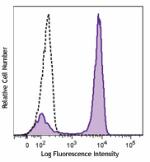
Human peripheral blood monocytes were stained with Ultra-LEA... -
Pacific Blue™ anti-human CD14
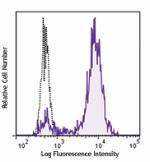
Human peripheral blood monocytes stained with clone M5E2 Pac... -
APC/Cyanine7 anti-human CD14
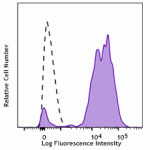
Human peripheral blood monocytes were stained with CD14 (clo... -
Alexa Fluor® 700 anti-human CD14
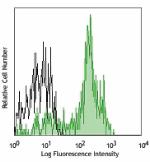
Human peripheral blood monocytes stained with M5E2 Alexa Flu... -
PerCP/Cyanine5.5 anti-human CD14
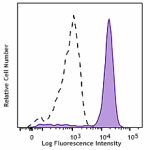
Human peripheral blood monocytes were stained with CD14 (clo... -
Biotin anti-human CD14
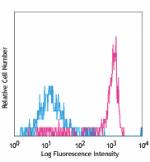
Human peripheral blood monocytes stained with biotinylated M... -
Brilliant Violet 421™ anti-human CD14
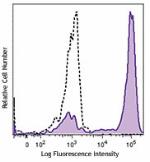
Human peripheral blood monocytes were stained with CD14 (clo... -
Brilliant Violet 570™ anti-human CD14
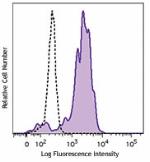
Human peripheral blood monocytes were stained with CD14 (clo... -
Brilliant Violet 605™ anti-human CD14
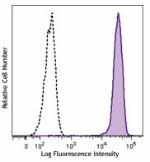
Human peripheral blood monocytes were stained with CD14 (clo... -
Brilliant Violet 650™ anti-human CD14
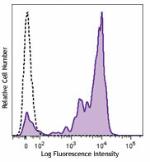
Human peripheral blood monocytes were stained with CD14 (clo... -
Brilliant Violet 711™ anti-human CD14
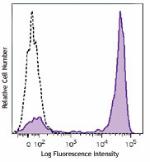
Human peripheral blood monocytes were stained with CD14 (clo... -
Brilliant Violet 785™ anti-human CD14
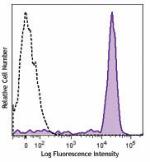
Human peripheral blood monocytes were stained with CD14 (clo... -
Brilliant Violet 510™ anti-human CD14
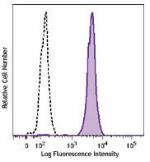
Human peripheral blood monocytes were stained with CD14 (clo... -
Purified anti-human CD14 (Maxpar® Ready)
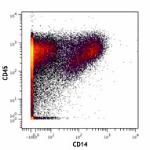
Human PBMCs stained with 154Sm-anti-CD45 (HI30) and 160Gd-an... -
PerCP anti-human CD14
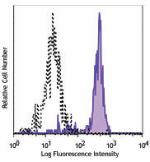
Human peripheral blood monocytes were stained with PerCP CD1... -
FITC anti-human CD14

Typical results from human peripheral blood monocytes staine... -
PE/Dazzle™ 594 anti-human CD14
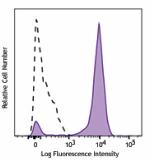
Human peripheral blood monocytes were stained with CD14 (clo... -
Pacific Blue™ anti-human CD14
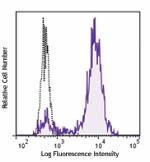
Typical results from human peripheral blood monocytes staine... -
APC/Fire™ 750 anti-human CD14
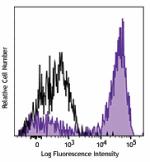
Human peripheral blood monocytes were stained with CD14 (clo... -
APC anti-human CD14

Typical results from human peripheral blood monocytes staine... -
TotalSeq™-A0081 anti-human CD14
-
TotalSeq™-B0081 anti-human CD14
-
TotalSeq™-C0081 anti-human CD14
-
PE anti-human CD14

Typical results from human peripheral blood monocytes staine... -
PE/Cyanine5 anti-human CD14
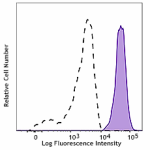
Human peripheral blood monocytes were stained with CD14 (clo... -
TotalSeq™-D0081 anti-human CD14
-
APC/Fire™ 750 anti-human CD14
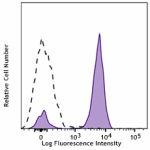
Typical results from human peripheral blood monocytes staine... -
GMP FITC anti-human CD14
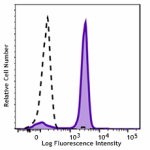
Typical results from human peripheral blood monocytes staine... -
PE/Cyanine7 anti-human CD14
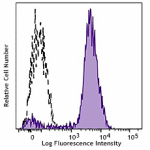
Typical results from human peripheral blood monocytes staine... -
GMP APC anti-human CD14
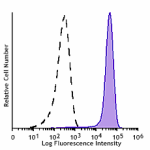
Typical results from human peripheral blood monocytes staine... -
GMP PE anti-human CD14
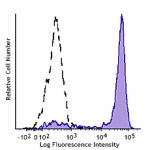
Typical results from human peripheral blood monocytes staine... -
PE/Dazzle™ 594 anti-human CD14
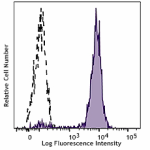
Typical results from human peripheral blood monocytes staine... -
GMP Pacific Blue™ anti-human CD14
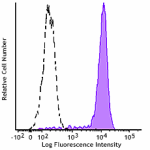
Typical results from human peripheral blood monocytes staine... -
GMP APC/Fire™ 750 anti-human CD14
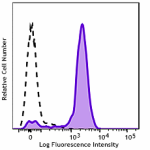
Typical results from human peripheral blood monocytes staine... -
PerCP/Cyanine5.5 anti-human CD14
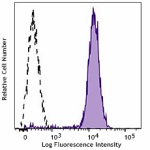
Figure Legend: Typical results from human peripheral blood m... -
Spark Violet™ 500 anti-human CD14
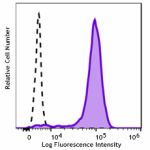
Human peripheral blood monocytes were stained with anti-huma... -
GMP PE/Dazzle™ 594 anti-human CD14
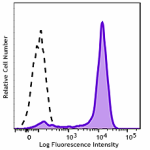
Typical results from human peripheral blood monocytes staine... -
APC/Fire™ 810 anti-human CD14
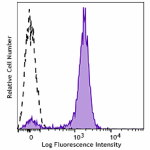
Human peripheral blood monocytes were stained with anti-huma... -
PE/Fire™ 700 anti-human CD14
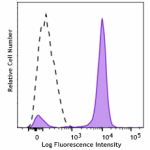
Human peripheral blood monocytes were stained with anti-huma... -
GMP PE/Cyanine7 anti-human CD14

Typical results from human peripheral blood monocytes staine... -
Spark Violet™ 538 anti-human CD14

Human peripheral blood monocytes were stained with anti-huma... -
Spark Red™ 718 anti-human CD14

Human peripheral blood monocytes were stained with anti-huma...
 Login/Register
Login/Register 











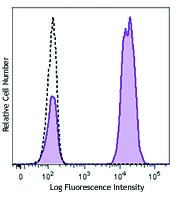
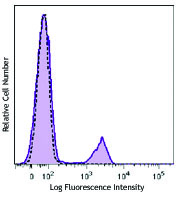

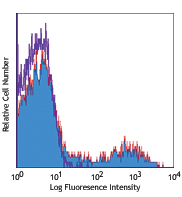



Follow Us